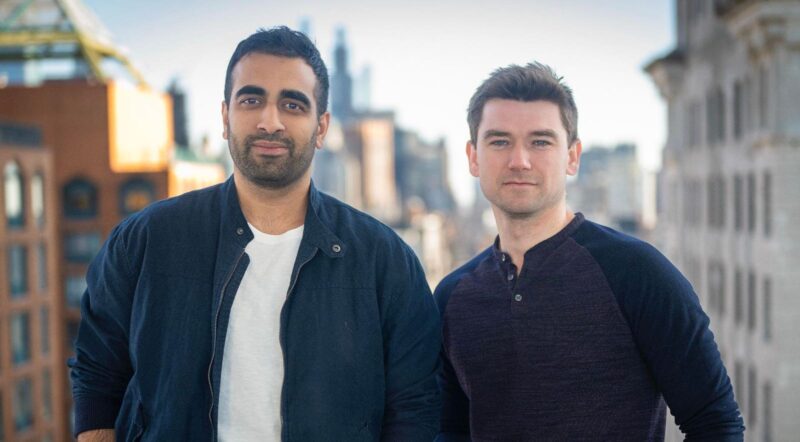Finch cofounders and longtime friends Viraj Bindra (left) and Ben Weems (right) started their AI legal software startup Finch after noticing the pain points for plaintiff attorneys.
Finch
Welcome back to The Prompt.
About a year ago, Viraj Bindra watched as his friend’s law firm struggled with a deluge of cases, far more than it had the capacity to handle. In the end, the firm had to turn away cases that had a fair chance of winning simply because it didn’t have the bandwidth. Bindra soon learned that this is a widespread problem that impacts a lot of people: Some 77% of American households can’t access legal help when they need it, in part due to staffing shortages at law firms. “For everyday Americans, counsel is more of a luxury than a right,” he said.
So Bindra, an ex-DoorDash product manager, decided to build AI software to ease that burden–and help lawyers more easily manage lots of clients. In April 2025, he launched Finch, a voice-based AI system that automates administrative tasks typically done by paralegals, such as retrieving medical records, setting up and tracking insurance claims, etc. The startup also hires its own paralegals to ensure and improve the accuracy of its product. Finch is “taking on the work that otherwise a law firm would’ve had to hire staff to do,” he said.
The New York-based startup is selling its technology to personal injury lawyers and plaintiff firms that make money based on contingency, meaning they aren’t paid unless there’s a settlement or victory at trial. These lawyers are more incentivized to use AI than those who bill their clients hourly, as it helps their staff’s productivity and allows them to take on more cases, Bindra said.
In just six months, Bindra claims his startup has seen significant revenue growth though he declined to disclose specific numbers. The company announced today it has raised $20 million in Series A funding led by Redpoint Ventures, which valued it at $100 million, according to a person familiar with the round. It’s a solid start, but Finch faces a growing cluster of competitors with startups like Harvey, Legora and EvenUp already emerging as front runners in the AI legal landscape. Meera Clark, a partner at Redpoint Ventures said Finch’s biggest differentiator is its focus on helping smaller law firms save direct labor costs.
Let’s get into the headlines.
BIG PLAYS
Retail giant Walmart is doubling down on AI. The company announced a partnership with OpenAI that will allow users to shop for its products directly through ChatGPT. The idea is that people who are already using the tool to plan meals and find new recipes can also buy needed ingredients while they’re at it. In recent months, OpenAI has made a concerted effort to add e-commerce capabilities to ChatGPT, recently forging similar deals with Shopify and Etsy.
CHIPS + COMPUTE
On the heels of its massive deal with chip giant AMD, OpenAI announced yet another partnership, this time with Broadcom. Under this deal, OpenAI will design its own chips to train and run its models while Broadcom will provide infrastructure support like networking systems and custom chips for its planned buildout of 10 gigawatts worth of AI data centers. Broadcom’s shares jumped after the announcement, similar to other companies that have announced multi-billion dollar partnerships with OpenAI. CEO Sam Altman is clearly adept at crafting these deals, Bloomberg’s Matt Levine writes, by selling established companies a “world-changing vision” of the future of artificial intelligence to raise historic amounts of capital.
SHOW ME THE MONEY
Salesforce plans to invest $15 billion in San Francisco over the next five years to ramp up AI adoption across enterprises, the company said at its annual Dreamforce conference, though details on the investment are still unclear. The funding will be used to create an AI incubator hub on its San Francisco campus and upskill employees on how to use AI. Investors seemed unimpressed by the announcement–its share price closed down 3.6%, continuing the 28% slide it’s seen so far this year.
DEEP DIVE
It’s been a big year for AI infrastructure deals. In just the last month, OpenAI, Oracle, Nvidia, AMD and others have announced epic transactions worth hundreds of billions of dollars. The deals are complex, unconventional—and often circular: Nvidia’s up to $100 billion investment in OpenAI, announced late last month, for instance, will allow OpenAI to purchase Nvidia GPUs to build out its own data center capacity. In a similar deal that flips who gets equity, AMD and OpenAI recently announced their own strategic partnership in which OpenAI got a warrant for up to 160 million shares of AMD common stock, or 10% of AMD’s shares, that vests in tranches based on OpenAI using 6 gigawatts of AMDs GPUs over a period of time.
Behind this spate of deals is something of a stampede mentality. “The world needs much more compute,” OpenAI CEO Sam Altman posted on X announcing the AMD deal. Altman has been trumpeting that “more compute is more important now than ever before to succeed at our mission” for years.
“There’s so much impatience and desire to move quickly and fear of getting left behind that there’s a very high premium on getting the most you can the fastest,” says Stella Biderman, executive director of AI nonprofit EleutherAI, which trained an open-source version of GPT-3 on CoreWeave GPUs.
And that’s leading them to make these scratch-my-back deals that are literally set up to help them help one another. Thanks in large part to the big deals, valuations are skyrocketing, and the billionaire founders, executives and investors tied to the massive AI data center buildout have benefited the most. By Forbes’ count, 20 of the most notable billionaires tied to the explosive growth in AI infrastructure spending have already added more than $450 billion to their fortunes since January 1.
Read the full story on Forbes.
MODEL BEHAVIOR
AI-powered bots accounted for around 51 percent of internet traffic in 2024. Thanks to Sora, OpenAI’s social media platform to share AI-generated videos, more AI slop is proliferating across social media, making it harder to distinguish between what’s real and what’s fake. Large language models are writing everything from tweets to blog posts to resumes while fake candidates are giving job interviews to AI agents, opening bank accounts and buying concert tickets. All that AI has led tech leaders like Reddit cofounder Alexis Ohanian and OpenAI CEO Sam Altman to propound the “dead internet theory”— the idea that the internet is dominated by bots instead of humans. Once dismissed as a conspiracy theory, this may be coming true in the age of AI.








